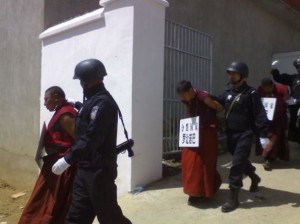Designed to crackdown on illegal activity, China’s “strike hard” campaign is creating additional problems for Tibetans living in Tibet—and now for those living in Nepal. In a public notice issued in the Kanlho Tibetan Autonomous Prefecture on 9 March 2012, authorities plan to re-launch the campaign, this time in “collaboration with the Nepalese police.” The program encourages citizen reporting of illegal activity, but Tibetans worry that its emphasis on national unity uniquely targets the Tibetan community.
The “strike hard” campaign was a program first implemented by the Chinese government in 1983 to stifle escalating crime in China. The program focused on issues such as human trafficking, fraud, robbery, gambling, gang crime and substance abuse by encouraging the public to report anything considered harmful to social stability and national unity.
The program was again launched in Tibet in 1996 with increased security and raids as a warning against protesters and demonstrators. According to the Tibetan Review, the campaign resulted in the arrest of 492 monks and the expulsion of 9,997 monks and nuns from their religious centers in just two years.
The notice issued in March criminalizes ethnic separatism and warns citizens against inciting, instigating, participating, fabricating or devising any plans that harm the Chinese state. “Strike hard” highlights national unity as a technique of restoring law and order, which has posed an obvious conflict for the culturally separatist Tibet. To enforce the new rules, special committees have been created to lead security efforts alongside existing agencies in Lhasa. Tibetan organizations say that religious leaders, political activists and new arrivals are being identified as suspect, and bolstered security measures may make this a particularly difficult time to be a nonconformist to Chinese policy.
Recent developments indicate the scope of “strike hard” will extend past Tibetan borders and into Nepal, which is home to roughly 14,000 Tibetans-in-exile. The Central Tibetan Administration (CTA) said in a statement: “It will also engage the Nepalese government and its police force to collaborate with the Chinese police to suppress Tibetans in Nepal, who the Chinese government alleged of carrying out separatist activities.”
Only time will tell the outcome of the modified “strike hard” campaign, but many Tibetans fear the same violent treatment and repression of the 1996 launch. The CTA reiterated that “these repressive policies have failed and only deepened the Tibetan people’s resentment against the Chinese government.”





 Print
Print Email
Email